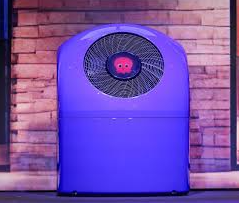
Company aims to transform heat pump aesthetics and improve accessibility with new product launch
Octopus Energy has announced a stylish new heat pump design that aims to transform how consumers perceive and use these heating systems. The company showcased the innovative purple heat pump during a London event, marking what it sees as a new era in clean heating technology.
Unlike the typical bulky and industrial-looking heat pumps resembling external air conditioning units, the Octopus model stands out with a striking aesthetic, a compact size (1.1 metres tall and 86 centimetres wide), and operates at a noise level similar to that of a fridge. The company claims its heat pump provides heat comparable to traditional gas boilers while offering improved comfort through smart tariffs and room sensors.
Greg Jackson, Octopus Energy’s founder, described the launch as a “huge day for clean heating,” highlighting that the heat pump is not only efficient but also challenges the perception of heat pumps as unattractive.
The new heat pump can be significantly more affordable for some customers thanks to a £5,000 Government grant aimed at promoting cleaner home heating options. In specific cases where no additional home modifications—such as larger radiators or water tank installation—are needed, the heat pump could be provided at no cost. However, for most households requiring such upgrades, installation costs will likely start at around £3,000 after the grant.
Heat pumps have been touted as a key part of the UK’s strategy to reduce carbon emissions, which currently see around 17% coming from building heating. Functioning as reverse air conditioners, they absorb external heat to warm homes, even in cold conditions, and can be carbon-free if powered by green electricity.
Despite their environmental benefits, heat pumps have often faced criticism due to high initial costs, especially when compared to gas boilers. However, with a Government target to install 600,000 heat pumps per year by 2028, Octopus hopes its new design will help make the transition to cleaner heating more attractive and accessible to homeowners.










